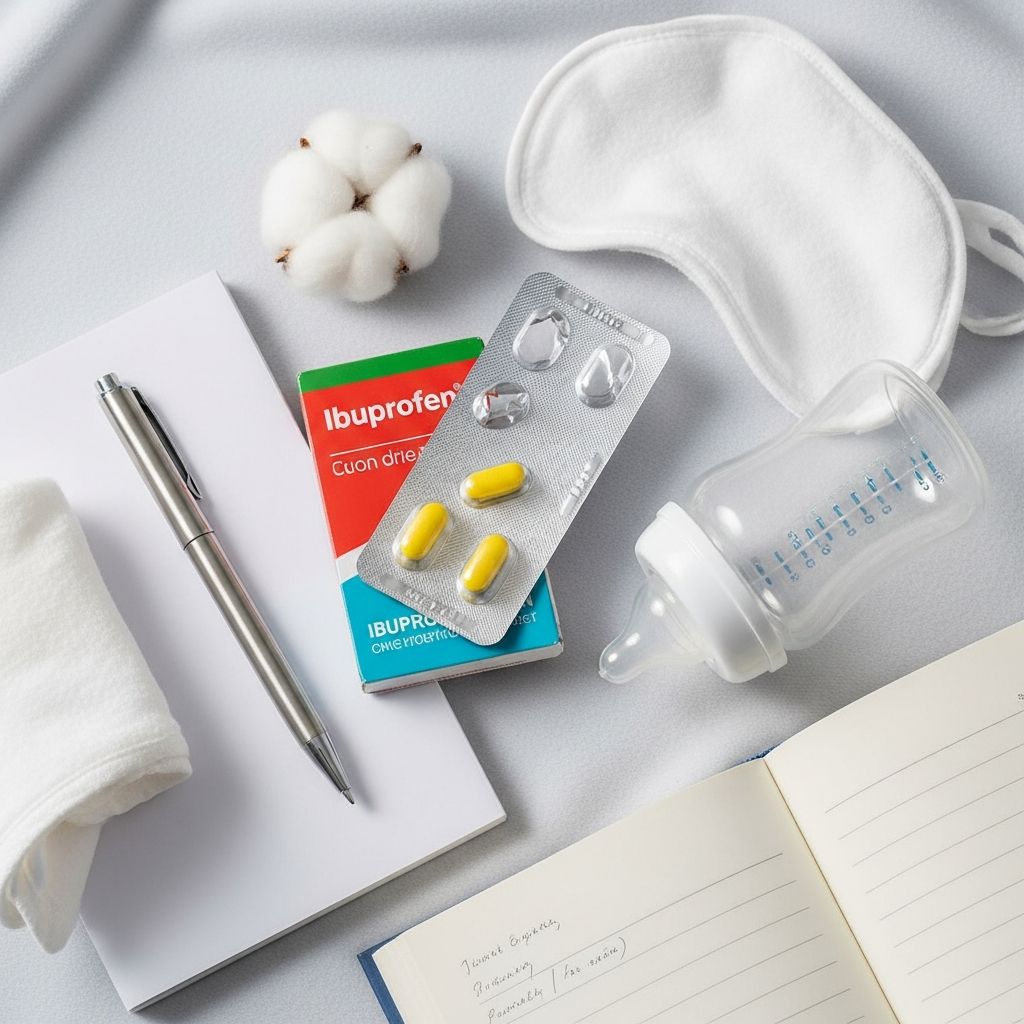Ibuprofen and Breastfeeding: Safety, Guidelines, and Practical Advice
A comprehensive guide to the safe use of ibuprofen for nursing mothers, featuring dosage, alternatives, and expert recommendations.

Ibuprofen and Breastfeeding: What Every Nursing Mother Needs to Know
Managing postpartum pain, headaches, and cold symptoms is a common concern for new mothers. Many wonder if taking ibuprofen while breastfeeding is safe for their baby and whether it affects breast milk or supply. Ibuprofen, one of the most widely used pain relievers, is often the first medication considered by breastfeeding mothers. However, understanding its safety profile, optimal use, alternative pain management strategies, and important precautions is crucial for informed decision-making.
Table of Contents
- Ibuprofen and Breastfeeding Safety Profile
- Best Practices for Taking Ibuprofen While Nursing
- Special Considerations and When to Avoid Ibuprofen
- Safe Alternatives for Pain Relief While Breastfeeding
- Cold and Flu Management for Nursing Mothers
- Frequently Asked Questions
Ibuprofen and Breastfeeding Safety Profile
Ibuprofen is a nonsteroidal anti-inflammatory drug (NSAID) known for its effectiveness in reducing pain, inflammation, and fever. Common brands include Advil and Motrin. For breastfeeding mothers, ibuprofen is generally considered safe because it has a short half-life and limited transfer into breast milk. Studies show that a breastfed infant would ingest only about 0.2% of a pediatric ibuprofen dose, and in trials where mothers were administered standard doses, no traces were found in their breast milk.
- Short half-life: Ibuprofen is rapidly cleared from the mother’s system, minimizing exposure to the infant.
- Minimal breast milk transfer: Trace amounts (less than 1%) may pass into milk, but these are considered clinically insignificant.
- No evidence of harm: Research has not shown any adverse effects on infants who ingest small amounts of ibuprofen through breast milk.
- No impact on milk supply: Ibuprofen does not affect breast milk production.
- Recognized as first-choice: Many medical and breastfeeding organizations advise ibuprofen as the preferred NSAID for nursing mothers[10].
Despite its safety, mothers should always consult their healthcare provider before starting, stopping, or altering any medication regimen while nursing.
Best Practices for Taking Ibuprofen While Nursing
Correct usage is key to maximizing ibuprofen’s benefits and minimizing risk while breastfeeding.
- Use the minimum effective dose: Take only enough ibuprofen to control symptoms, without exceeding the recommended daily limit.
- Standard dosage guidelines: Typical over-the-counter ibuprofen is 400 mg every 4-6 hours, not exceeding 1200 mg per day unless prescribed otherwise.
- Timing for minimal infant exposure: Consider taking ibuprofen immediately after feeding or before your baby’s longest sleep interval. This scheduling allows the medication to reach peak levels when the next feeding is furthest away.
- Avoid extended-release formulations: Opt for regular, short-acting ibuprofen rather than extended-release, which can result in sustained medication levels in breast milk.
- Read medication labels carefully: Choose products that treat only the symptoms you have; avoid combination medications with unnecessary ingredients.
- Monitor for side effects: Ibuprofen may cause nausea, heartburn, or stomach upset. Severe side effects are rare with short-term use but can include kidney, heart, or gastrointestinal problems if used for extended periods.
- Track maximum daily dosage: Do not exceed the daily adult dose (generally up to 3.2 grams, but 1.2 grams for OTC use)[10].
Always discuss any concerns, appropriate dosages, or scheduling strategies with your healthcare provider, especially if you have underlying health conditions or take other medications.
Recommended Dosage Table
| Ibuprofen Formulation | Recommended Dosage | Maximum Daily Dose | Notes |
|---|---|---|---|
| Regular OTC Tablets | 400 mg every 4-6 hours | 1200 mg (OTC) | Take after feeding for minimal milk transfer |
| Prescription Strength | 400-800 mg every 6-8 hours (as prescribed) | 3200 mg (by prescription) | Consult your healthcare provider |
| Extended-release | Avoid use | N/A | Prefer short-acting for control over timing |
Special Considerations and When to Avoid Ibuprofen
Although ibuprofen is widely regarded as safe, certain circumstances call for caution:
- Premature or medically fragile infants: If your baby was born prematurely or has kidney problems, seek specific medical advice before taking ibuprofen.
- Maternal medical conditions: Mothers with a history of asthma, stomach ulcers, kidney issues, or gastrointestinal disorders should use ibuprofen only after professional consultation.
- Pregnancy: Do not take ibuprofen while pregnant. NSAIDs are associated with miscarriage risk, fetal heart defects, and increased maternal bleeding during pregnancy, especially after 20 weeks.
- Mixing with other pain medications: Do not combine ibuprofen with medications containing NSAIDs without medical supervision.
- Other painkillers to avoid: Aspirin and Pepto-Bismol are not recommended during breastfeeding, as aspirin can increase bleeding risks and has been linked to Reye’s syndrome in infants.
Summary Table: Ibuprofen – Precautionary Situations
| Condition | Ibuprofen Safety | Recommendation |
|---|---|---|
| Premature infant or kidney issues | Caution | Consult a healthcare provider |
| Mother with asthma or ulcers | Caution | Consult a healthcare provider |
| Pregnancy | Not safe | Use only with medical supervision; generally not recommended |
| Combining with aspirin | Not safe | Avoid; risk of Reye’s syndrome and bleeding |
Safe Alternatives for Pain Relief While Breastfeeding
If ibuprofen is unsuitable due to allergies or specific health issues, alternative medications and non-drug therapies are available:
- Acetaminophen (Tylenol): Considered safe for breastfeeding; passes only a minimal amount into breast milk and rarely causes problems for infants.
- Non-pharmacologic pain relief:
- Cold packs or warm compresses
- Gentle massage
- Rest and hydration
- Relaxation and deep breathing techniques
- Other NSAIDs: Diclofenac is sometimes used, but ibuprofen remains the preferred choice owing to its proven safety.
- Herbal remedies: Always vet with a healthcare professional. Many herbal products are not well-studied for use in breastfeeding mothers.
Cold and Flu Management for Nursing Mothers
Illness and postpartum symptoms often overlap. Many OTC cold and flu remedies contain multiple active ingredients that warrant careful selection if you are breastfeeding.
- Ibuprofen remains the preferred pain relief and fever reducer.
- Acetaminophen can be safely used for fever and mild pain.
- Avoid multi-symptom cold formulas: Ingredients such as pseudoephedrine, phenylephrine, and some antihistamines can affect milk supply or cause side effects in infants[10].
- Monitor for dehydration and exhaustion. Drink plenty of fluids and get extra rest while sick.
- Cough suppressants: Dextromethorphan is generally considered safe in small doses. Avoid codeine-containing products unless specifically prescribed.
- Topical treatments: Nasal saline and throat lozenges can ease symptoms without risk.
- Non-pharmacologic strategies: Use warm liquids, humidifiers, and steam inhalation for symptom relief.
Flu vaccination is also considered safe for breastfeeding mothers. The flu shot does not affect breast milk or infant health. In fact, it can help protect both mom and baby from illness.
Safe Medication Choices Table
| Symptom | Safe Medication | Caution Notes |
|---|---|---|
| Pain, fever, inflammation | Ibuprofen, Acetaminophen | Follow dosage guidelines; avoid prolonged use without advice |
| Cough | Dextromethorphan (small doses) | Avoid codeine unless prescribed |
| Nasal congestion | Saline sprays, steam inhalation | Pseudoephedrine may decrease milk supply |
| Cold/flu prevention | Flu vaccine | Safe for mother and baby |
Frequently Asked Questions (FAQs)
Q: Is ibuprofen safe for all breastfeeding mothers?
A: Ibuprofen is safe for most breastfeeding mothers when taken at recommended doses. However, mothers with certain health issues or premature/medically fragile infants should consult their healthcare provider before use.
Q: Will ibuprofen affect my breast milk supply?
A: No. Research shows that ibuprofen does not impact the quantity or quality of breast milk.
Q: Can I take ibuprofen before breastfeeding?
A: Yes. For minimal exposure to your baby, it’s best to take ibuprofen immediately after a feeding or just before a longer stretch between feeds.
Q: Are other painkillers, like acetaminophen, safe while breastfeeding?
A: Yes, acetaminophen (Tylenol) is also considered safe for nursing mothers.
Q: Are there medicines I should avoid while breastfeeding?
A: Yes. Avoid aspirin and Pepto-Bismol, as they pose risks of bleeding and Reye’s syndrome in infants. Aleve (naproxen) is also not favored due to its longer half-life.
Q: Is ibuprofen safe during pregnancy?
A: No. Ibuprofen and other NSAIDs are associated with increased risks during pregnancy, including miscarriage, fetal heart defects, and bleeding. Do not use without medical guidance if pregnant.
Q: Can I get a flu shot while breastfeeding?
A: Yes. Flu vaccination is safe and recommended for nursing mothers, offering protection for both mom and baby.
Q: What if my baby was premature or is sick?
A: Consult your healthcare provider for personalized recommendations. Premature or ill infants may have different tolerance and risks for medications passed through breast milk.
Key Takeaways for Breastfeeding Mothers
- Ibuprofen is generally safe for nursing mothers, with minimal transfer into breast milk and no known adverse effects for healthy infants.
- Use the lowest effective dose and schedule medication for minimal infant exposure.
- Avoid medications with unnecessary active ingredients, extended-release formulas, and drugs listed as unsafe for breastfeeding.
- Consult your healthcare provider if you, your baby, or both have health conditions affecting medication safety.
- Safe pain relief and cold treatments for breastfeeding mothers include ibuprofen and acetaminophen, as well as non-drug comfort measures.
- Flu vaccination is encouraged and safe for nursing mothers.
If you’re unsure about any medication or how it might affect your breastfeeding journey, always reach out to your healthcare provider, pharmacist, or lactation consultant for evidence-based guidance.












